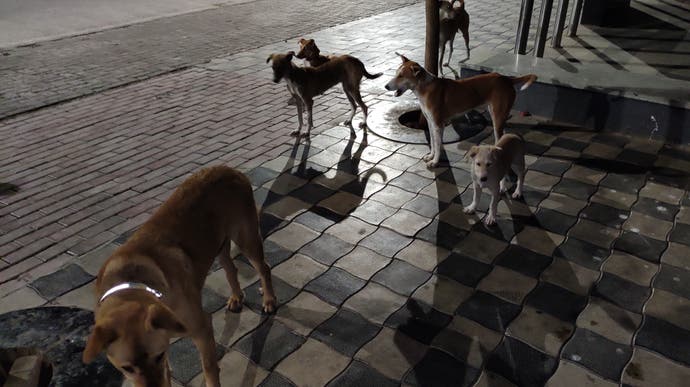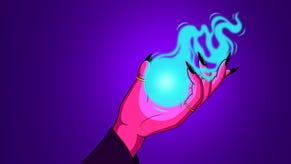Devs and doggos: how Nodding Head made Raji while saving stray Indian dogs
Paw patrol.
If you haven't already played Raji: An Ancient Epic, then you absolutely should. It's a terrific passion project from Nodding Head, an indie studio based in Pune, India, telling a story steeped in India's own culture, mythology and architecture.
For those who have finished it, you'll have hopefully stayed for the credits and seen something interesting. Credits, I think, are always interesting - they're after all the names of people responsible for making this game happen. Credits might also tell their own stories of a game's development, such as the special thanks given here to Epic Games, who had provided a grant to Nodding Head after the game's unsuccessful Kickstarter campaign, or to ID@Xbox, who helped give the game a larger platform (even if it would launch on the Switch first).
The most interesting tidbit in Raji's credits, however, is left right near the end: the Nodding Head Doggos.
I've seen names of newborn babies and pets given a mention in games before of course, but something struck me about seeing 12 dogs given a mention by a small indie studio (one of them turned out not to be a dog, though more on that later). As it turns out, nine of these are owned by the studio's co-founders Shruti Ghosh and Ian Maude. Nine! What a huge and busy family that must be. They're not just any dogs, however, but stray Indian breeds that they have rescued, fostered and then adopted.
That's not all, as since the pandemic, Shruti and Ian have also been feeding and caring for strays on the streets of Pune, all while tirelessly working to finish Raji.
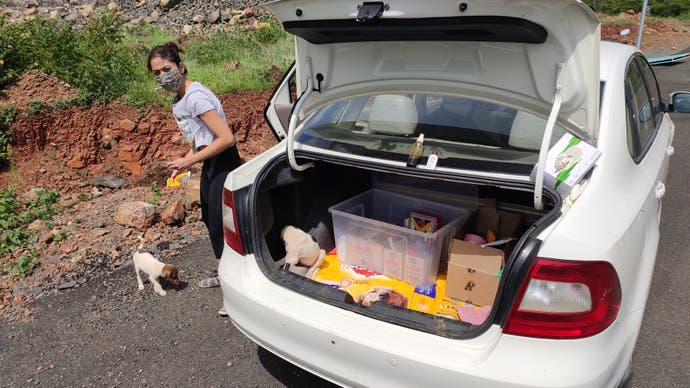
Saving India's street dogs is Shruti's real passion, though given the country has more than 30 million strays, there's only so much the team are able to do. Their care and rescue operation unwittingly began a few years ago when they adopted their first dog Hailey, ironically while going out to buy a new plant.
"We went to buy a plant, and that's when we spotted Hailey," Shruti tells me. "She was a little puppy then, and she was the only surviving one from the entire litter. The design college where we were teaching is on a highway that connects to other cities, so it's very busy with only big vehicles like trucks and buses - the chances of survival for strays are next to nothing."
It began with just visiting and feeding the dog every day, but Ian was so instantly smitten with Hailey that it didn't take long before they decided to adopt her. Before they knew it, they found themselves volunteering with two local organisations (Hope for Paws and Pune's World Trade Centre group) helping out with local dogs who were injured or with abandoned puppies, which also led them to adopting Killer - named after his killer alert eyes.
"We only wanted one dog. And then we got nine," Ian muses.
In that time, they've also been fostering a few other dogs, a couple which were later adopted by other members of the studio. But they really found themselves involved so much more with the local strays once the pandemic hit, with many businesses and restaurants that might have fed scraps in the past suddenly shut.
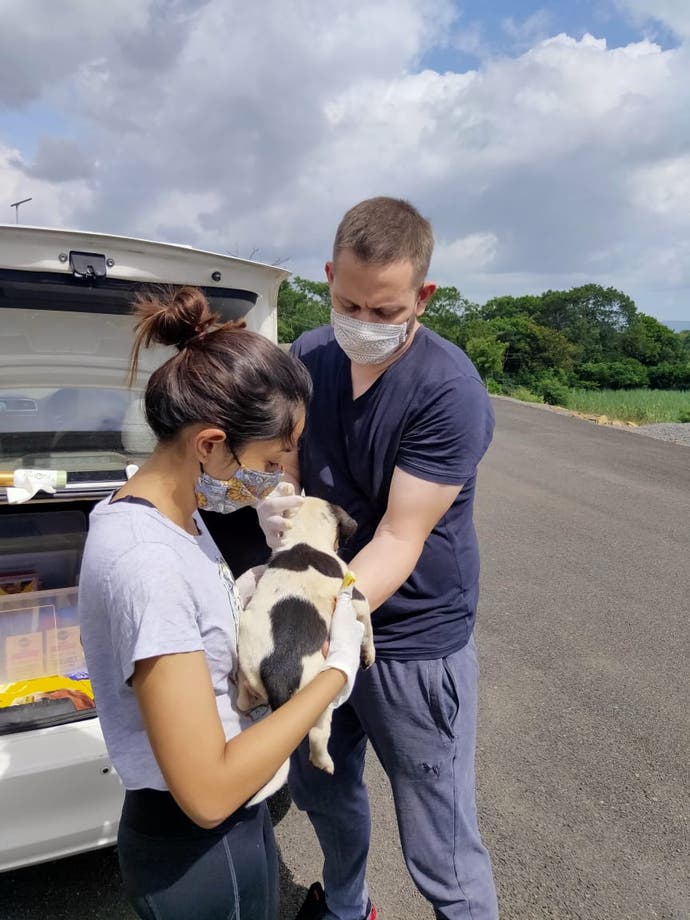
"We joined quite a few groups of volunteers who are passionate about caring for dogs and started feeding more than the numbers we usually feed," Shruti explains. "We slowly started taking up areas to feed dogs that people, who had health issues and couldn't go out anymore, couldn't feed. So that went up to a number of around 200 strays that we are feeding. When the lockdown started, we were feeding them every day."
Like many countries at the beginning of the pandemic, India had very strict lockdown restrictions where going outside could lead to arrests - Pune is incidentally one of the major COVID hotspots in the state of Maharashtra - so they needed to be recognised by police as dog feeders who could travel outside of their local vicinity.
It's unsurprisingly a lot of work. "It takes three hours every day for us to go out and feed all of them, and we have to drive from one area to another," says Shruti, while the feeding also might include breaking up fights or tending to injuries the dogs might have sustained from fighting with one another or on the road. Indeed, the boot of Shruti's car has a first aid box just for dogs, from antibiotics to vaccines.
Surprisingly, Ian learned first aid back when he was in the UK and had enlisted in the RAF Regiment Reserves. "We were taught some of the basic first aid for combat but I've never done it to humans - I've only ever applied it to animals. But it's proved worthwhile!" he laughs. Their local vet had also taught him how to vaccinate dogs or perform subcutaneous infusions, as being able to handle these things themselves ended up being easier than going to see a vet, which can be expensive.
Ian recalls their involvement with rescuing strays began in earnest when they first got a call to help with a young dog late at night. "She had gastritis, which is a killer for dogs," he explains. "She was so dehydrated that her blood was black - she was literally 12 hours away from death. We managed to take her to a vet, then over the next week or so, we went to see her every day, and you know, she survived it. She's an absolutely adorable little dog, and every time we see her, she's literally just jumping into our arms."
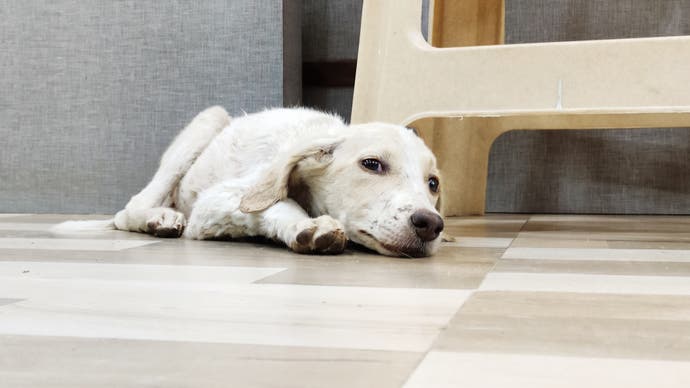
But they've also seen just as much tragedy, such as April, who was injured so badly that her vertebrae was fused with her neck, and despite their efforts to have her treated, they would find out a couple weeks later that she was killed by road traffic. The harsh reality is that these dogs are seen as little more than vermin, so drivers, already known for being reckless, give scant regard if one happens to cross the street.
It's not that there aren't dog owners in India either, they just happen to choose foreign breeds, such as Labradors or German Shepherds, or even Huskies, which are completely ill-suited to the Indian climate. I was also intrigued to learn that the Indian hound breed is named Rajapalayam because they used to be bred by kings ('Raja' being the Hindi term for a monarch). So is this an ugly byproduct of neo-colonialism and capitalism?
"I think it's just generations of people seeing these dogs mostly on the streets, and then as generations passed, people started bringing in foreign breeds, which then became a business," says Shruti. "A lot of illegal breeding also happens here, and even the pedigrees are abandoned. Very few people in India genuinely understand that dogs are actually part of your family, not just cute puppies that you then abandon because you don't have time for them."
Nonetheless, there are some signs of progress as the pandemic has been an opportunity for re-evaluation. She mentions that the Indian Prime Minister Narendra Modi had even recently been urging people to support local homegrown Indian businesses. This included encouraging people to adopt Indian dogs, while highlighting how the police and army have also begun training more Indian hounds in areas like security and detection.
"Nobody actually understands that these dogs are a lot more resilient to India's weather," Shruti continues. "A lot of people also need educating that you shouldn't be hurting them, even if they're on the street. They're just as intelligent, active and beautiful dogs as any other breed."
Shruti and Ian are also full of heartbreaking stories and trauma, such as Patch and his brother Goldie who were abandoned in a dumpster with a litter of puppies (apparently, it's common even for people who look after strays to move new litters outside their locality so that they don't have to deal with more mouths to feed), or another one suffering from cancer who now has a delayed reaction when peeing after several doses of chemotherapy, which is why I saw her wearing a nappy.
An honorary mention in the credits however goes out to the sadly departed Squadron Leader Poo, who wasn't even a dog but a bird that Ian and Shruti happened upon while walking their dogs.
"I think one of the dogs spotted them," Shruti recalls. "They fell from the nest and it was too high up for us to put it back, so we brought the little birdie home and tried to foster it, but I think it died of dehydration. We don't know what exactly happened because it was growing, even flying around although not ready to take off. Just one day we were in one of the busiest days of our schedule, and when we went to check on her, she had passed."
And the reason for that name was because the bird couldn't stop defecating itself. "Even if you try to feed it, it's like flapping around constantly, pooing everywhere," she laughs. "And then you clean it, and again - poop - every ten minutes. But it was cute!"
Since lockdown, caring for strays outside of the nine already in their home has been essentially a second job, albeit they lack the resources of an NGO, so all the expense is coming out of their own pockets. Yet they're just so passionate about this, and stories like how they brought another dog called Archie back from a severe case of tetanus really make it worthwhile.
"Because of COVID, the labs were shut so we couldn't even verify that it was tetanus," says Ian. "But all the telltale signs, like a locked jaw, were there. It's like she's a paraplegic with rigor mortis. We fixed up a harness in the cage, so that she could at least stand if nothing more than to increase her circulation whilst we were feeding her. Prior to feeding we would attempt a little physio too, Tetanus is a bacterial virus which affects the muscles, so it was imperative that we got her legs moving ASAP, and in addition to this, I was giving her three lots of IV treatment twice daily, morning and evening, both of which had antibiotics injected into the fleshy part of the Luer connector of the IV set. I was also administering intramuscular injection of folic acid [a type of B vitamin]."
"We had to constantly take care of her while doing our jobs working on the game - we had no sleep," Shruti says. "We were just constantly active, because we knew that not only was our game important, which we have been working on for so long, but we had to save that life, because if we didn't do something, nobody would have done anything for her."
Which, I suppose, is another reason why you should play Raji - do it for the doggos!
Raji is out on Switch, and is released today on PS4, Xbox One and PC.
